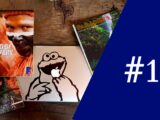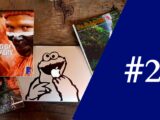2020 has been one of the most transformational years of my life.
Funnily, moving to a new country (from Papua New Guinea to Canada) made the smallest contribution to the shifts I’ve experienced.
What made all the difference were changes in my mindset, followed by taking action.
That’s what ultimately allowed me to triple my revenue compared to 2019. To find my niche. And to build a network of people who are just as committed as I am to make a difference in this world.
Today, I want to share the 10 major mindset shifts I made in 2020.
1. “Our brain is for having ideas, not storing them.”
This quote by Tiago Forte is burned forever into my memory.
Tiago is the creator of Building a Second Brain (BASB), an online course I took in April 2020, which turned out to be one of the best decisions I’ve ever made.
Like most of us, I’m consuming tons of information. Even though I gained valuable insights from books, articles, and emails, the knowledge seemed to slip through my fingers. Forgotten as soon as I moved on to the next thing.
When working in the corporate world, this mindless consumption wasn’t really putting me at a disadvantage. Everyone was struggling with the same problem.
But, since launching my own business, I felt the pressure to bring more value to the table. I started to take online courses and consume even more information in the hope of learning and improving.
It was an enigma for me how some entrepreneurs, like Tiago, could come up with so many great ideas and produce new content and products so fast.
BASB completely changed the way I approach information.
I established a habit of capturing what I find valuable. Everything I learn is conserved for my future self in my second brain within a structure that makes it easy to retrieve the information just when I need them.
It feels like I’ve gained a superpower.
2. Everything is an intermediate package
This is another major mindset shift I got from BASB that has positively influenced how I get stuff done.
How do we usually approach a new project?
We start to research, pulling together information from all different sources – files on our computer, handwritten notes, emails. It’s a lot of work tracking down the information, making sense of it, and building something new out of it.
With my second brain, the majority of my inputs are already stored in a central place. Every note is an intermediate package, ready to be used in a new way.
Take writing this blog post, for example. All the different elements already existed in my second brain as notes taken at some point during the last year. I just had to pull them together.
Starting a new project doesn’t feel like a heavy lift anymore because often it’s as much as 80% done already.
3. My voice matters (and yours does, too)
Ever felt like everyone else is having this secret you’re not being let in on? Something seems so easy and natural for others that it’s painful how difficult the same thing is for you.
For me, that was showing up publicly online. There were already countless copywriters out there with successful blogs and thousands of followers. What was even the point of me trying to enter that space?
I felt like everything had been said before. What could I add to the already bustling conversation?
Then I participated in Write of Passage (WoP) in July, the second transformational online course I took in 2020.
And with it came a major mindset shift. I wrote about it in the course community forum:
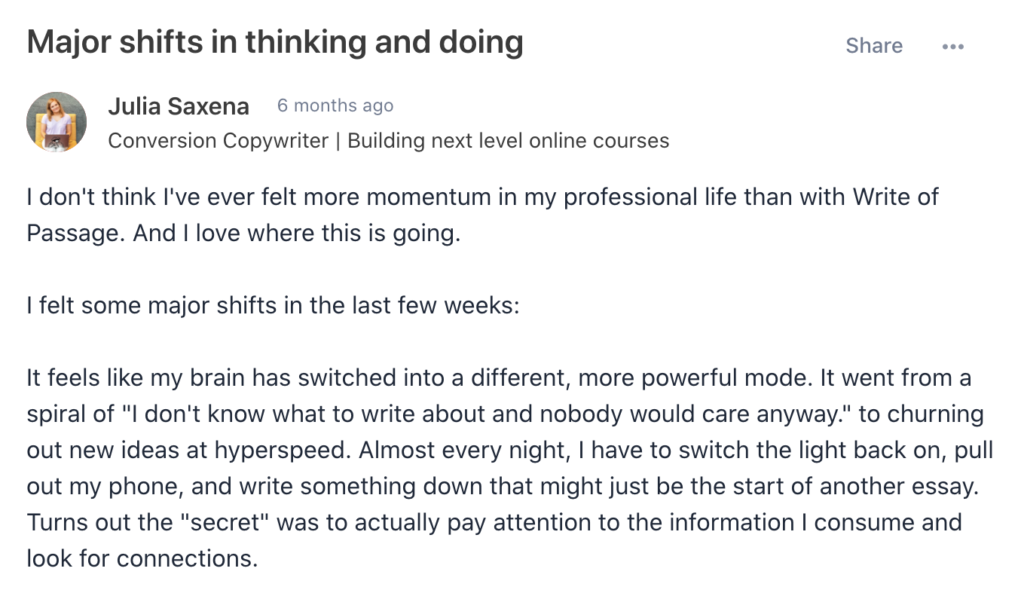
I realized, you don’t have to come up with original concepts and frameworks to share something publicly. Nobody really does. It’s about sharing how you apply well-known frameworks, seeing new connections between concepts, and bringing your unique perspective.
Describe the world through your lens. There’s someone out there who’ll resonate with how you talk about your passion and industry.
This new, powerful mindset was critical to setting up my blog and launching my newsletter. It wouldn’t have happened otherwise.
4. Creation isn’t a lonely pursuit
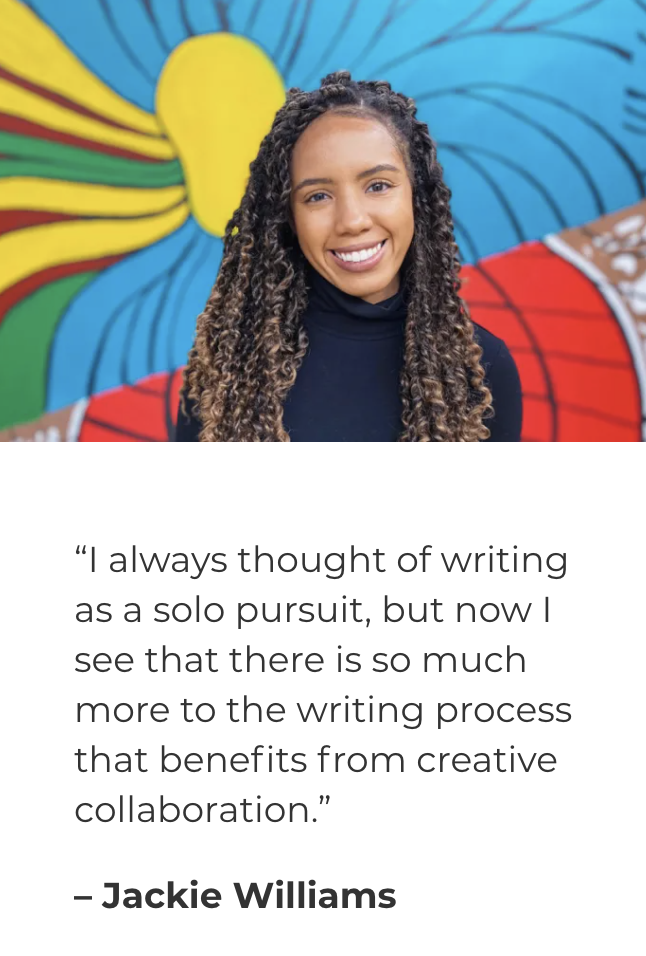
What’s the image that pops into your head when I say “writer”?
For me, it used to be a person alone in a room, either furiously typing away on the keyboard or staring out the window, lost in thought.
Turns out I’m not the only one who had this belief. Jackie, one of the alumni mentors in WoP, shared something similar on the WoP homepage.
Through the course, I learned that this isn’t reality.
Ideas rarely come to you when you sit alone and think. Rather, they’re sparked in conversations with peers, friends, even strangers.
When you share your curiosities, little seedlings of ideas, others will add to them. They’ll ask clarifying questions that help you refine your idea. And they’ll give you valuable feedback on the validity of your idea.
Ultimately, what you create will be so much better because of the input of others.
One way to have these conversations is by using social media, which brings me to my next mindset shift…
5. I can’t ignore social media
Some people are naturals on social media. They just share whatever comes to their mind.
Not me. I’ve always been more of an observer, liking my friends’ comments and pictures. I sometimes share holiday pics on Instagram.
Mostly I’ve ignored social media. Scoffed at it even as a time-suck that a “really productive person” shouldn’t succumb to.
This year, again thanks to WoP, I’ve got to know a whole different side to it.
All fellow students seemed to be active on Twitter, like Kyle…
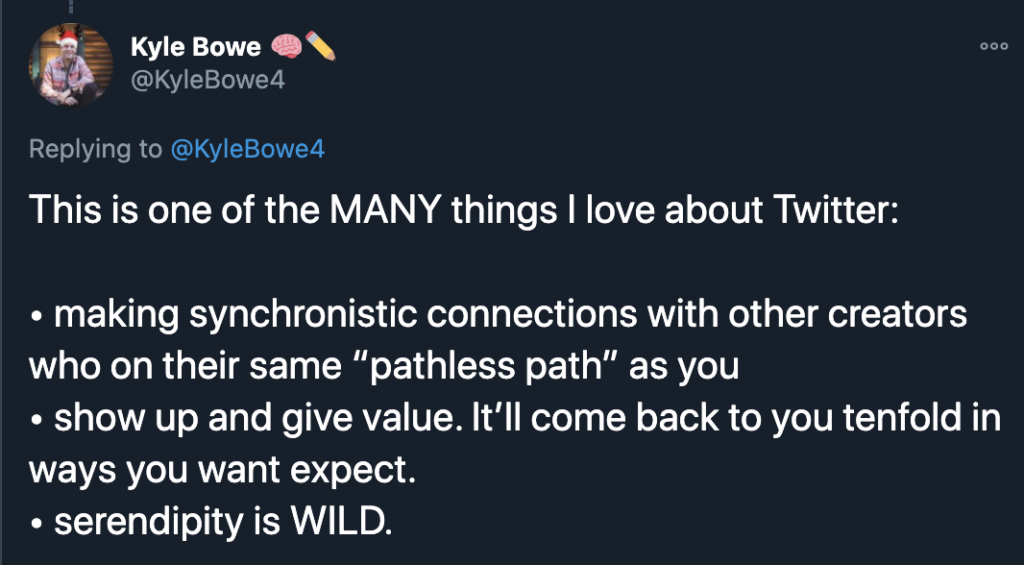
And WoP creator, David Perell, is living proof of the power of this platform and has publicly shared his approach to leveraging it.
By ignoring social media, I was cutting myself off from a lot of opportunities.
Since I didn’t want to miss out, I signed up (or better reactivated the account I set up in 2008).
In just 6 months of using Twitter more actively and “the right way”, several new opportunities opened up for me that would never have been possible otherwise.
Dedicating time every day for conversations on the platform has been a positive force behind my growth.
6. Internalizing the “Building in Public” principle

Keeping everyone around you updated on what you’re working on is basically free marketing.
There’s even a name for this principle, which I first heard about in 2020: Building in Public.
I’ve made a video dissecting it. In 2:43 min, you’ll learn what makes it so powerful, why it’s actually hard to do, and what building in public looks like in practice.
7. Getting comfortable with self-promotion
As I’ve written in my blog post “How to pitch yourself the honest, non-sleazy way”, I’ve always been uncomfortable talking about myself.
But Robbie Crabtree is right in saying…
“If you aren’t selling yourself, who will?”
It’s solely my responsibility to ask people to sign up for my email list or follow me.
I have to get over myself and do it.
What ultimately made me feel more comfortable about it? Knowing that I’m providing value. Getting positive feedback and reinforcement that what I’m sharing is helping people. And wanting to reach more people with my message.
8. Give value first without expecting anything in return
I’m extremely grateful for all the wonderful people I got to know online this year, many of whom I now call friends.
Being part of the BASB and WoP communities of like-minded people with equally crazy ambitions, all supporting each other, had everything to do with my growth this year.
What makes these communities so powerful is that everyone is focused on providing value without expecting anything in return.
People generously give their time and share their experiences and expertise to help each other out.
This creates incredible momentum for new projects and collaborations.
If you want to dive deeper into this topic, I can recommend Andrew Yu’s article: Servant Networking: Serve, Don’t Network.
9. Only action leads to true insight
One of the first lessons I heard when I began freelancing over two years ago was to pick a niche. Specialize in something, become known for it.
That’s hard to do when you’re just starting out and don’t even know yet what kind of projects you like working on.
I thought hard about my niche but to no avail.
So I said “yes” to pretty much every opportunity. I was experimenting.
After a while, I felt more drawn to writing sales pages and websites than any other type of copy project. I thought I had finally decided on my specialty, although it was still a very broad one.
Then, something fascinating happened: a window of opportunity opened up.
Because I was sharing my insights into copywriting and online courses openly online, people started to take notice.
And finally, two experts in their field asked me to help launch and run the first cohorts of their online courses.
I got to play out my strength as a copywriter and former project manager.
My niche has become helping experts scale their impact by building transformational online courses.
Bottom line: You’ll discover your niche only by taking action. Be ready to see it evolve and change over time.
10. The need for time away from the screen
I’ve never spent so much time in front of a screen than in 2020. Often as much as 6 hours per day on Zoom calls alone.
There was a good reason for it: Almost everything new and exciting happened online.
But I also worked pretty much every day after dinner until 11 pm and was then wondering why I had trouble falling asleep. At some point, I started treating Saturdays and Sundays as normal workdays, too.
Although this allowed me to support the launch of two online courses simultaneously while also completing projects for my copywriting clients, it won’t surprise you that there was a toll.
My offline relationships suffered as I hardly ever took my mind away from work.
2021 needs to be different, with a clear balance between offline and online.
No more work after dinner, no meetings before lunch, more time outside, and “real” weekends. It’s in my power to set those boundaries.
I can’t tell you how excited I am for 2021. I’m ready to make this another transformational year.





